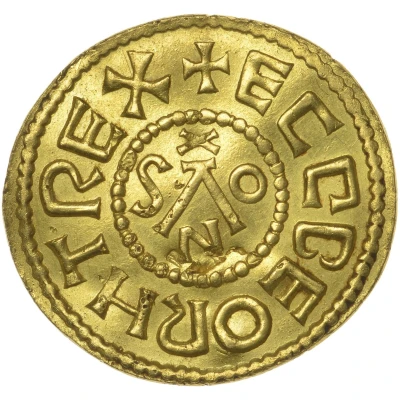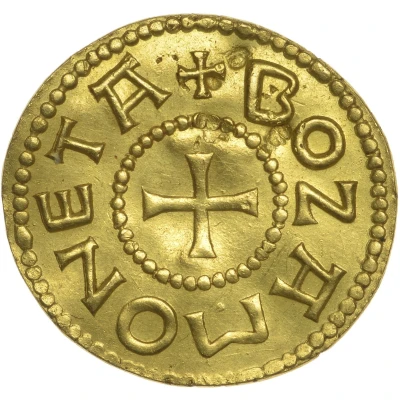


© Dix Noonan Webb
Gold Penny / Mancus of 30 Pence - Ecgberht Winchester
| Gold | 4.82 g | - |
| Location | Kingdom of Wessex (Kingdoms of British Isles and Frisia) |
|---|---|
| Moneyer | Bosa |
| King | Ecgberht (802-839) |
| Type | Standard circulation coin |
| Years | 802-839 |
| Value | 1 Mancus (⅛) |
| Currency | Pound |
| Composition | Gold |
| Weight | 4.82 g |
| Shape | Round (irregular) |
| Technique | Hammered |
| Orientation | Variable alignment ↺ |
| Demonetized | Yes |
| Updated | 2024-10-09 |
| Numista | N#301469 |
|---|---|
| Rarity index | 100% |
Reverse
Small cross pattée within inner circle, moneyer's name around.
Script: Latin
Lettering: + BOZA MONETA
Translation: Bosa, moneyer.
Comment
West Saxon mint, possibly Winceastre (Winchester).
A rare and as yet, uncatalogued Gold Penny or Mancus of 30 Pence, found in a field in West Dean, Wiltshire in March 2020.
BBC News - Anglo-Saxon coin found in Wiltshire
Dix Noonan Webb - Important gold penny of Ecgberht, king of the West Saxons
Interesting fact
One interesting fact about the Gold Penny / Mancus of 30 Pence - Ecgberht (Winchester) (802-839) is that it is one of the earliest examples of a gold coin minted in England. It was issued during the reign of King Ecgberht of Wessex, who ruled from 802 to 839, and it features a unique design that includes a stylized portrait of the king on one side and a cross on the other. The coin was likely used for high-value transactions and may have been used as a symbol of the king's power and wealth.